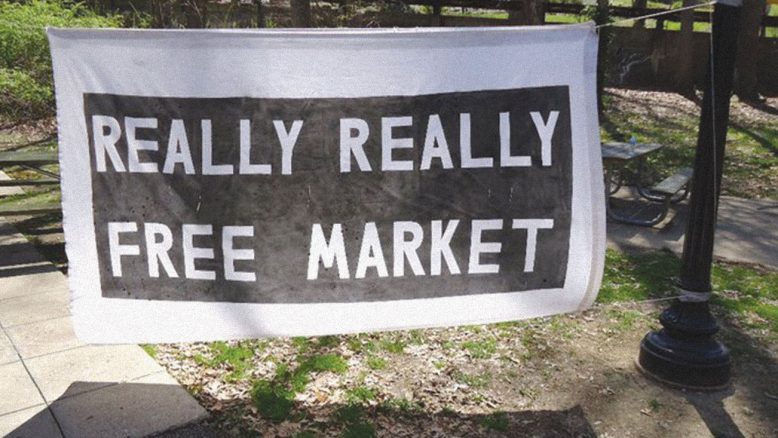Filed under: Analysis, Anarchist Movement, Community Organizing, Gentrification, Ontario

Report from anarchists in so-called Kingston, Ontario, who analyze an attempt to use the Really Really Free Market model as an intervention against gentrification.
On September 30th, 2018, members of AKA Autonomous Social Centre in Kingston hosted another Really, Really Free Market (RRFM) in our neighbourhood. Over the course of 3 hours, approximately 150 to 200 folks came by to share and take free things! For those who are not aware of RRFMs, they are events where folks give and take things with no money exchanged. They emerged as public events in direct opposition to so-called free trade negotiations. (check out more details on Wikipedia or here).
At AKA, we have been hosting these ‘markets’ with the intention of offering an accessible introduction to anarchist approaches to community, with mixed success. We have hosted RRFMs in different locations in our neighbourhood for several years. Over the past while, we have given some thought into how we can get more political traction out of these events. For this one, we decided to intervene in the conversations around gentrification happening in our already-very-gentrified neighbourhood. We have frequently hosted the RRFMs in a park that has been long-slated for a new road, which has been significantly opposed by many local groups, including us. This time, we hosted it in Skeleton Park, which is formally called McBurney Park, a downtown park with amazing big trees. McBurney Park is also the namesake of the neighbourhood’s facebook forum that had hosted some classist posts and comments.
The Skeleton Park neighbourhood is historically working-class and over the past 20 years there has seen a significant influx of middle-class folks and soaring rental rates and house prices. The dominant tension in the neighbourhood is generated by primarily liberal middle-class folks who are trying to remake the neighbourhood in their own image. This includes: policing the neighbourhood and posting images of “suspicious” people, putting up surveillance cameras, generally lacking empathy for people who have different lived experiences than them, wanting public spaces to change towards their preferences (security, lighting, cleanliness), ignoring the ways that they are already used as valuable meeting spaces for all kinds of people. This park is a central meeting place and therefore was ideal for an intervention.
Some people who came out to the event follow AKA events, others found it in the ‘garage sale’ section of kijiji, while others happened upon us accidentally. At this event, we had an active tabling presence where we shared anarchist literature as well as some flyers that talked about middle class privilege and how not to be a middle-class jerk in a working-class neighbourhood. In the past we have made speeches about why we were hosting a RRFM, however, found it to be an awkward forum for a public speech. We decided that one on one conversations would be a better way of engaging people and explaining the anti-capitalist and mutual aid values that motivate us. We had some productive conversations, shared literature with many and overhead others connecting with each other in a way that hints at a community where solidarity, mutual aid and direct action are valued and practiced.
Introducing and supporting others in implementing accessible anarchist practices is an important way of getting people connected to anarchism. We know that folks need many entry-points into radical politics. Some get radicalized through militant protests and others through actions like food not bombs, overdose prevention sites, and RRFMs that open a fleeting glimpse of something external to the logic of capitalism. It hints at possibilities outside of the overbearing structures that we live in allowing people to imagine how they can find that feeling again. While through their very form and nature RRFMs are anti-capitalist, opposed to charitable models (though they can be co-opted by charitable do-gooders), and simple approaches to reclaiming ‘public’ space, they are also easy to understand and implement.
Another strategy we are trying to implement is the dissemination of anarchist practices. At the RRFM we had conversations with at least two people who were very keen to organize a RRFM in other parts of the city where they live. While we are excited about working with others to host RRFMs to create and activate more lateral communal relationships to address material needs, we are also aware of some challenges that we will encounter. When you want to do work in neighbourhoods that are not your own, who you decide to work with and where can have an impact on who you reach and who feels welcome.
We also seek to co-develop these future events so that we can make sure anarchism doesn’t get left out of the equation. Too often events like this can be co-opted by charities and non-profits that seek to “help” people without any analysis of power or without any desire to change the conditions under which we all live.
Moving forward, some of the questions we are asking ourselves are:
-
How do you seed other anarchist collectives or groups?
-
What are effective ways of sharing anarchist practices in various contexts to reach beyond the usual suspects?
-
What are other interventions to disrupt every day domination to solicit within others the feeling of and desire for Another World?
AKA Autonomous Social Centre
germinations (at) riseup (dot) net





